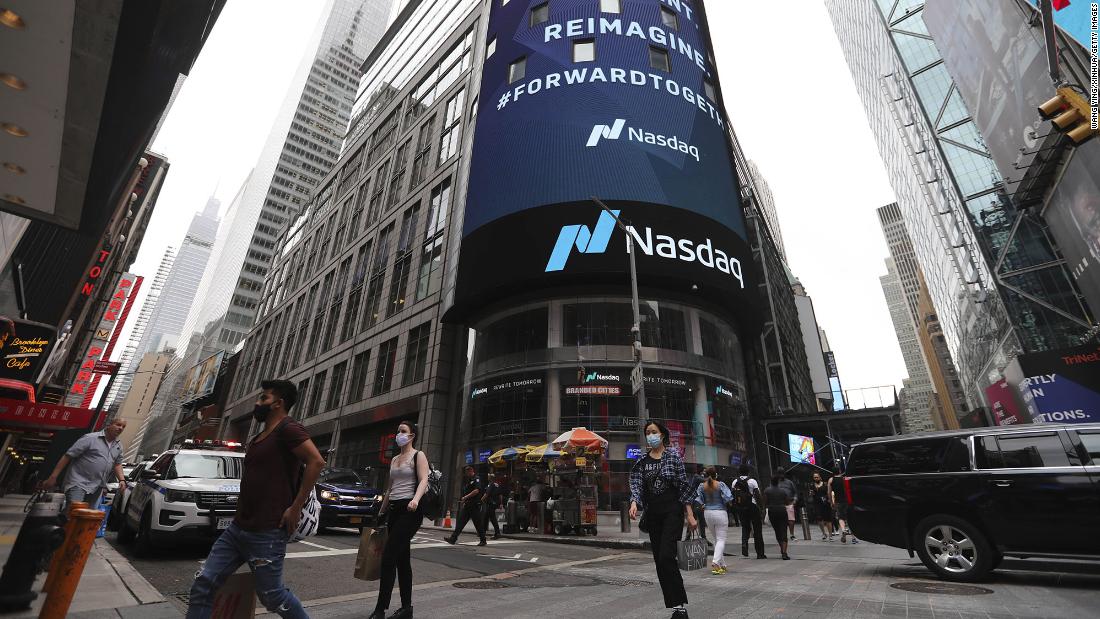
A version of this story first appeared in CNN Business' Before the Bell newsletter. Not a subscriber? You can sign up right here.
What's happening: The tech-heavy Nasdaq Composite plunged 5%, its worst day since June. The Dow dropped 2.8% and the S&P 500 fell 3.5%. Shares of Apple (AAPL) and Tesla (TSLA), which had been on a tear since they announced stock splits that made shares more affordable, plummeted 8% and 9%, respectively.
The action came after a summer of hand-wringing as stocks continued to reach new records, driven by massive central bank stimulus and unbridled enthusiasm for tech companies. As Apple's valuation topped $2 trillion, more than the entire Russell 2000, strategists had been telling clients that a correction was inevitable.
Bespoke Investment Group noted that some of the worst-hit stocks had been "the most aggressively valued and the biggest gainers" so far this year. And with tech looking like a very crowded trade, a rotation into other sectors is likely a good thing.
"With such a stellar run, I would expect there would be a readjustment in stocks," Susannah Streeter, senior analyst at Hargreaves Lansdown, told me.
The question now is whether Thursday's rout marks the beginning of a more prolonged period of selling, or if it amounted to one-time profit-taking ahead of a holiday weekend.
Closely-watched measures of volatility indicate that the turbulence could continue. The CBOE Market Volatility Index, or VIX, which tracks volatility in the S&P 500, fell back slightly Friday but remains elevated, which is unusual when stocks are near all-time highs.
Meanwhile, the CBOE Nasdaq Volatility Index — which follows the Nasdaq 100 — continued to climb. It's now at its highest level since April.
"There might be a bit of a bumpy road ahead," Streeter said.
Still, she noted that tech shares aren't likely to go fully out of favor any time soon given their perks as a defensive bet during the pandemic. Tech companies have been far less affected by social distancing than many other firms, allowing them to continue to reap huge profits. For investors looking for safe returns, that's hard to ignore.
"Valuations are extended on all measures except relative to bonds," Bank of America strategists told clients on Thursday. "But liquidity is abundant, with dry powder at private and public funds, high cash allocations among individuals, still tepid sentiment on stocks, and not a lot of better income options than US equity dividends."
America's jobs recovery may have cooled in August
America's jobs recovery may be losing steam.
Coming up: Economists polled by Refintiv predict the US economy added 1.4 million jobs in August, down from nearly 1.8 million jobs added in July and 4.8 million in June, my CNN Business colleague Anneken Tappe reports. The data posts Friday morning.
The unemployment rate is expected to fall to 9.8% in August, which would be the first time below 10% since March. That would also be less than the peak unemployment rate reached during the Great Recession.
Good sign: New weekly jobless claims for the last week of August fell below 1 million for only the second time since March.
"The resurgence of the coronavirus did not produce a meaningful increase in layoffs in the Sun Belt based on jobless claims data," Goldman Sachs strategists said in a research note.
That said: America would still be down nearly 11.5 million jobs from February, even with more than 1 million job gains last month.
"This is likely to be a long journey yet," Deutsche Bank's Jim Reid cautioned clients on Friday.
Even Saudi Aramco can't ignore the oil crunch
The coronavirus pandemic is upending the energy industry and pushing its top players to make big changes. That includes Saudi Aramco, the world's largest and most profitable oil producer.
The dramatic crash in prices this year is weighing on Saudi Arabia's state oil giant, which relies on pumping crude to generate the cash it needs to pay dividends to investors and finance a big chunk of government spending.
Now, Aramco may be forced to do what was once unthinkable: abandon deals and sell assets. First on the block could be its plan to build a network of refineries in the world's biggest markets in a bid to extract more value from each barrel of crude it pumps.
The latest: Deals to get into the refining business in China and India — two of the world's biggest energy consumers — appear to have been put on hold in recent weeks. Media reports this week suggested that Aramco would also delay the expansion of a major refinery in the United States.
"It is fair to say that there is a re-evaluation of everything at the moment," an Aramco source familiar with business strategies regarding the projects told CNN Business.
The realignment of priorities could have long term consequences for the company and the Saudi kingdom, given the politically sensitive nature of some deals.
The US jobs report for August posts at 8:30 a.m. ET.
Coming next week: The clock is running out for TikTok as Chinese owner ByteDance tries to lock in a US buyer.
"now" - Google News
September 04, 2020 at 06:38PM
https://ift.tt/2QTXc8v
Tech stocks finally dropped. What now? - CNN
"now" - Google News
https://ift.tt/35sfxPY
Bagikan Berita Ini














0 Response to "Tech stocks finally dropped. What now? - CNN"
Post a Comment